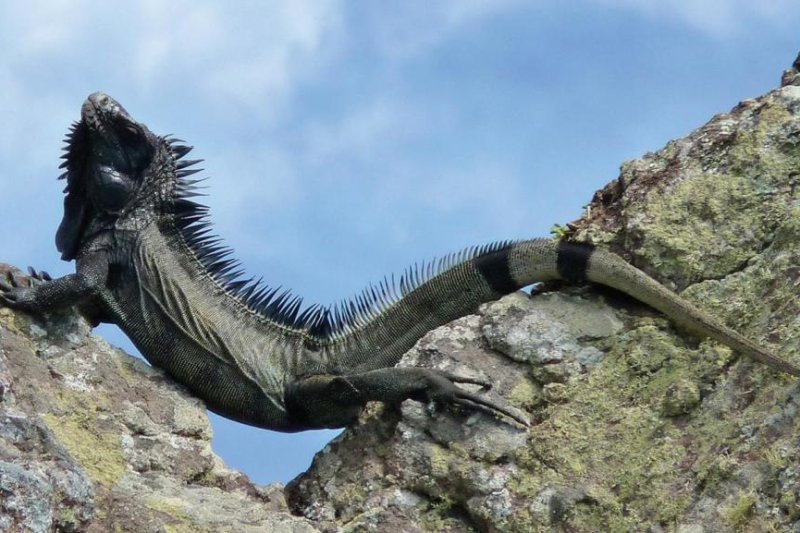
Scientists discovered a new species of iguana, the melanistic black lizard, or Iguana melanoderma. Photo by M. Breuil
April 14 (UPI) -- Scientists have discovered a new iguana species in the eastern Caribbean. The novel reptile, Iguana melanoderma, was found on the Saba and Montserrat islands of the Lesser Antilles.
Researchers announced their discovery in the journal ZooKeys. According to the paper, the new species -- the melanistic black iguana -- is severely threatened.
"This new melanistic taxon is threatened by unsustainable harvesting -- including for the pet trade -- and both competition and hybridization from escaped or released invasive alien iguanas," scientists wrote.
The Lesser Antilles are home to three iguana species, but only one is endemic. The Lesser Antillean iguana, Iguana delicatissima, has lived among the northernmost islands of the Lesser Antilles for thousands of years. More recently, the islands have welcomed a pair of newcomers: the common iguana, Iguana iguana iguana, from South America and the green iguana, Iguana rhinolopha, from Central America.
Physically, the new species is differentiated by a black spot located between the eye and its ear cavity. Juveniles also boast a dorsal carpet pattern that darkens as the reptiles age. Genetically, the species is marked by a series of unique mitochondrial patterns.
According to the International Union for Conservation of Nature, the Lesser Antillean iguana remains a species of least concern, but the group's Red List fails to differentiate between different populations. In some parts of the Caribbean, such as Guadeloupe, the common iguana and the green iguana have pushed the Lesser Antillean iguana to the brink of extinction through competition and hybridization.
Similar trends are underway on the islands of the Lesser Antilles, and scientists worry the newly discovered melanistic black iguana will face a similar fate.
"With the increase in trade and shipping in the Caribbean region and post-hurricane restoration activities, it is very likely that there will be new opportunities for invasive iguanas to colonize new islands inhabited by endemic lineages," lead study author Frédéric Grandjean, professor at the University of Poitiers in France, said in a news release.
Researchers hope that future analysis of the region's iguana species will help scientists better differentiate endemic lineages from invasive iguanas.
"Priority actions for the conservation of the species Iguana melanoderma are biosecurity, minimization of hunting and habitat conservation," said Grandjean. "The maritime and airport authorities of both islands must be vigilant about the movements of iguanas, or their sub-products, in either direction, even if the animals remain within the same nation's territory. Capacity-building and awareness-raising should strengthen the islands' biosecurity system and could enhance pride in this flagship species."
Researchers hope that future analysis of the region's iguana species will help scientists better differentiate endemic lineages from invasive iguanas.
"Priority actions for the conservation of the species Iguana melanoderma are biosecurity, minimization of hunting and habitat conservation," said Grandjean. "The maritime and airport authorities of both islands must be vigilant about the movements of iguanas, or their sub-products, in either direction, even if the animals remain within the same nation's territory. Capacity-building and awareness-raising should strengthen the islands' biosecurity system and could enhance pride in this flagship species."
No comments:
Post a Comment